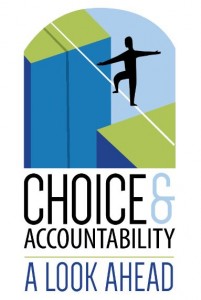 As parental choice matures, so does the definition and character of “accountability.”
As parental choice matures, so does the definition and character of “accountability.”
We asked some of the sharpest minds in the choice realm to help us understand the challenges ahead, as parental choice becomes more and more mainstream. We’ll be running their responses in a series of posts, beginning Monday.
Here’s the prompt:
In education, as in all other fields, accountability involves a combination of government regulation and consumer choice. Generally, as consumer choice increases, government regulation decreases, and vice versa. This is certainly true in education today. Charter schools, vouchers, homeschooling and tax credit scholarships are all less regulated than the neighborhood district schools students are required to attend by law.
The challenge we face today and moving forward is the wide variation in parental choice and government regulations in various sectors of public education that are operating side by side. This is sure to lead to tensions and complications. For example:
- Some parents do not understand why their traditional district schools – which they like – must comply with standardized testing and school rating regimens they consider excessive, while voucher-receiving private schools do not.
- Choice critics often successfully exploit these differences in “regulatory accountability” to undermine legislative and public support for parental choice by arguing that these programs are not accountable.
- Choice supporters are divided over how best to balance parental choice and governmental oversight, as the debates over government-mandated testing and sanctions for low-performing voucher schools show.
- The question of regulatory accountability would seem to become more complex as educational choice moves down to the course level, with an explosion in options and providers.
So, here’s the question. What should education accountability look like in the year 2025?
Let’s assume we’re still in transition then. But let’s also assume many states have much more robust parental choice programs than they do now, with vouchers, tax credit scholarships, charter schools, virtual schools, education savings accounts and a-la-carte course offerings all on the menu.
How will government regulations evolve to accommodate this more diverse, more decentralized system? Will there still be state-mandated testing, rating systems, sanctions and school closings? If so, will these regulations be applied to all providers equally?
Will there be new third-party players on the landscape – for instance, more outfits that collect data on providers and rate them? Or outfits that help parents navigate all the new options?
How will the accountability systems of the future balance the individual needs of families and educators with the public good? How will we insure that public resources are spent effectively and efficiently in a public education system organized around customization?
Here’s the lineup:
Monday, June 9: Jason Bedrick, policy analyst with Cato’s Center for Educational Freedom.
Tuesday, June 10: Michael Q. McShane, research fellow in education policy studies at the American Enterprise Institute.
Wednesday, June 11: Robin Lake, director of the Center on Reinventing Public Education.
Thursday, June 12: Patricia Levesque, executive director, Foundation for Excellence in Education.
Friday, June 13: Chad Aldis, Thomas B. Fordham Institute’s Vice President for Ohio Policy and Advocacy.
Monday, June 16: Thomas Arnett, research fellow in education at the Clayton Christensen Institute for Disruptive Innovation.
Enjoy!


